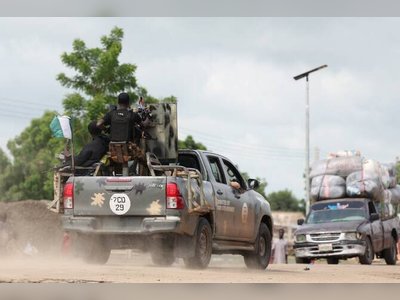
Afghanistan Earthquake Death Toll Rises; Survivors Face Humanitarian Crisis
As the death toll from this week's earthquakes in eastern Afghanistan rises, survivors are facing a severe aid shortage, with global organizations warning of dwindling resources for food, shelter, and medical supplies.
Rescue efforts continue in the mountainous regions of Kunar and Nangarhar as more bodies are recovered following the two earthquakes that struck on Sunday and Tuesday.
The initial magnitude 6 earthquake caused significant damage and destruction, while a second quake, measuring 5.5, exacerbated rescue operations by causing landslides and disrupting access to remote areas.The death toll has now surpassed 1,457, with thousands more injured and over 6,700 homes destroyed.
Survivors describe losing everything, including their homes and belongings, as they desperately search for loved ones among the rubble.
The International Federation of Red Cross and Red Crescent Societies (IFRC) warns that needs are vast and growing rapidly, estimating that up to 84,000 people have been directly or indirectly affected.With resources already strained in a country recovering from years of war and poverty, harsh weather conditions further compound the situation.
Funding cuts for foreign aid, coupled with limitations imposed by the Taliban on aid workers, contribute to the crisis.
The World Health Organization highlights a $3 million funding gap, emphasizing the urgent need for essential supplies such as medicines and trauma kits.The UN World Food Programme faces an even more pressing concern, noting that it has only enough funds and stock to support survivors for another four weeks.
Calls are growing from aid organizations for donors to provide long-term support beyond immediate relief efforts.
They stress that Afghanistan cannot be left to face multiple crises alone.Survivors in Kunar province recount entire families lost and the desperate search for loved ones, often with limited resources.
Rescue operations involve airdropping commando forces into areas inaccessible by land, while aid is delivered by truck and helicopter.
Despite these efforts, survivors remain at risk of being forgotten amidst mounting challenges and dwindling global support.
The initial magnitude 6 earthquake caused significant damage and destruction, while a second quake, measuring 5.5, exacerbated rescue operations by causing landslides and disrupting access to remote areas.The death toll has now surpassed 1,457, with thousands more injured and over 6,700 homes destroyed.
Survivors describe losing everything, including their homes and belongings, as they desperately search for loved ones among the rubble.
The International Federation of Red Cross and Red Crescent Societies (IFRC) warns that needs are vast and growing rapidly, estimating that up to 84,000 people have been directly or indirectly affected.With resources already strained in a country recovering from years of war and poverty, harsh weather conditions further compound the situation.
Funding cuts for foreign aid, coupled with limitations imposed by the Taliban on aid workers, contribute to the crisis.
The World Health Organization highlights a $3 million funding gap, emphasizing the urgent need for essential supplies such as medicines and trauma kits.The UN World Food Programme faces an even more pressing concern, noting that it has only enough funds and stock to support survivors for another four weeks.
Calls are growing from aid organizations for donors to provide long-term support beyond immediate relief efforts.
They stress that Afghanistan cannot be left to face multiple crises alone.Survivors in Kunar province recount entire families lost and the desperate search for loved ones, often with limited resources.
Rescue operations involve airdropping commando forces into areas inaccessible by land, while aid is delivered by truck and helicopter.
Despite these efforts, survivors remain at risk of being forgotten amidst mounting challenges and dwindling global support.











